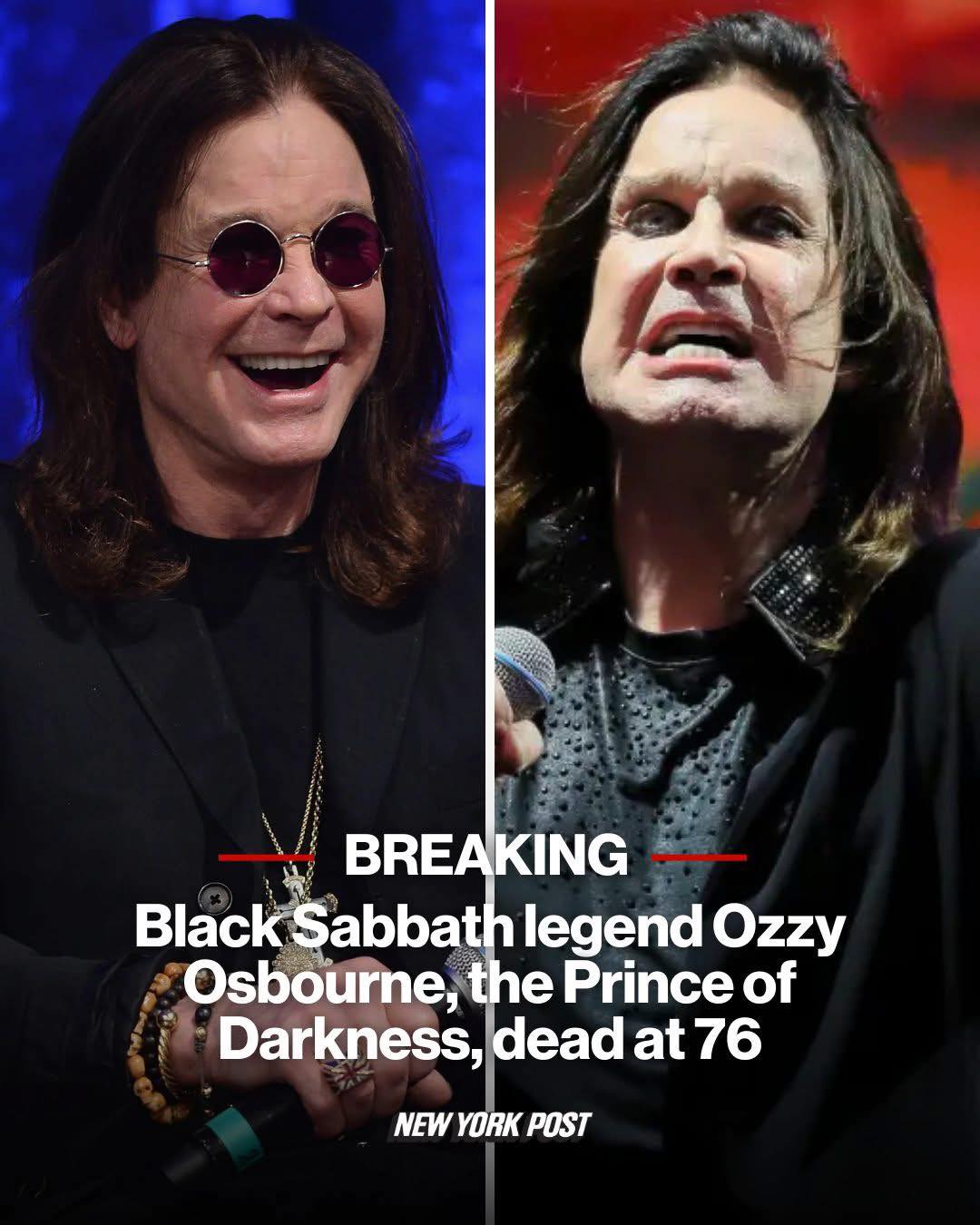Introduction

Ozzy Osbourne, the iconic frontman of Black Sabbath and one of the most influential figures in heavy metal history, has died at the age of 76. On Tuesday, July 22, 2025, his family confirmed the heartbreaking news: the legendary rocker passed away “surrounded by love.” As millions of fans across the globe mourn his loss, tributes pour in for the man who redefined the sound of an era and influenced generations of musicians.
This blog article explores the life, legacy, and final moments of the “Prince of Darkness.” We’ll answer the most frequently asked questions about Ozzy Osbourne’s death, reflect on his legendary music career, and examine what made him one of rock’s most unforgettable icons. If you’re searching for verified information, emotional insight, and a high-quality tribute, this post offers everything you need.
Who Was Ozzy Osbourne?
John Michael “Ozzy” Osbourne was born on December 3, 1948, in Birmingham, England. He rose from humble beginnings to become the lead singer of Black Sabbath, a band widely regarded as the pioneer of heavy metal. His powerful voice, eccentric personality, and rebellious energy turned him into a global icon.
In the 1970s, Ozzy and Black Sabbath released era-defining albums such as Paranoid, Master of Reality, and Black Sabbath Vol. 4. These records changed the course of rock music, introducing a darker, heavier sound that would influence countless genres from doom metal to grunge.
Ozzy’s solo career was equally legendary. After parting ways with Black Sabbath in 1979, he went on to produce classic albums like Blizzard of Ozz and Diary of a Madman, featuring hits such as “Crazy Train”, “Mr. Crowley”, and “No More Tears.”
Cause of Death: What Happened to Ozzy Osbourne?
As of the time of this publication, Ozzy Osbourne’s official cause of death has not been disclosed publicly. However, in recent years, he had been battling numerous health issues, including:
- Parkinson’s Disease (diagnosed in 2019)
- A severe fall at home in 2019
- Complications from spinal surgery
- A history of drug and alcohol abuse during his early career
His family released a heartfelt statement confirming his passing:
“Our beloved Ozzy passed peacefully, surrounded by love, on Tuesday, July 22. We are beyond grateful for the love and support he received from fans around the world.”
Tributes Pour in From Around the Globe
As news of Ozzy’s death spread, millions took to social media to share their grief, including fellow musicians, celebrities, and devoted fans. Major rock festivals and global media outlets paid tribute. Here are a few notable reactions:
- Tony Iommi, Black Sabbath guitarist: “I’ve lost a brother. The world has lost the greatest voice in metal.”
- Sharon Osbourne, his wife and longtime manager: “Ozzy was the love of my life. He gave everything to music and his fans.”
- Metallica, via X (formerly Twitter): “There will never be another. Rest in power, Ozzy.”
Ozzy Osbourne’s Legacy: 7 Ways He Changed Music Forever
1. Pioneer of Heavy Metal
With Black Sabbath, Ozzy forged the blueprint of heavy metal—dark, distorted riffs, haunting lyrics, and theatrical performances.
2. Enduring Solo Success
Few artists successfully reinvent themselves, but Ozzy did just that. His solo career sold over 100 million albums worldwide, proving his talent extended far beyond Sabbath.
3. The Birth of Ozzfest
In 1996, Ozzy and Sharon launched Ozzfest, a metal music festival that became a rite of passage for up-and-coming bands.
4. A Pop Culture Phenomenon
Through The Osbournes, MTV’s wildly popular reality show, he became a household name across all demographics.
5. Mental Health Awareness
Ozzy’s openness about his Parkinson’s diagnosis and struggles with addiction helped destigmatize conversations around health in the music industry.
6. Timeless Songs
Hits like “Crazy Train” and “War Pigs” remain staples on classic rock radio and streaming platforms, with billions of plays globally.
7. Global Influence
Ozzy’s impact spans generations and cultures. From South America to Scandinavia, he remained a global symbol of rock rebellion.
Frequently Asked Questions About Ozzy Osbourne’s Death
1. When did Ozzy Osbourne die?
He died on Tuesday, July 22, 2025, at the age of 76.
2. What was the cause of Ozzy Osbourne’s death?
The cause of death has not been officially revealed. However, Ozzy had battled Parkinson’s disease and other chronic health issues for several years.
3. Was Ozzy Osbourne still performing before his death?
No, Ozzy officially retired from touring in early 2023 due to health complications. His last performance was a surprise appearance at the Commonwealth Games in Birmingham in 2022.
4. Did Ozzy Osbourne reunite with Black Sabbath before he died?
Yes, he reunited with Black Sabbath for a final album (13) and a farewell tour (The End Tour) that concluded in 2017 in Birmingham.
5. Will there be a public memorial or tribute concert?
The family has not yet announced a public memorial, but sources close to the Osbournes suggest a tribute concert is being planned with major rock acts.
Key Statistics Highlighting Ozzy Osbourne’s Impact
- Studio albums released: 12 (solo), 19 (with Black Sabbath)
- Album sales (combined): Over 120 million copies worldwide
- Streaming plays: Over 4 billion across major platforms
- Grammy Awards: 3 wins, 8 nominations
- Rock and Roll Hall of Fame: Inducted in 2006 (as part of Black Sabbath)
The Man Behind the Madness: Ozzy’s Personal Side
Despite his wild reputation, Ozzy was a deeply sensitive and spiritual man. Known for his unfiltered honesty, dark humor, and love for animals, he was also a devoted father and husband. He and Sharon Osbourne’s marriage became one of the most famous—and enduring—love stories in rock.
In his memoir, I Am Ozzy, he wrote:
“I’m not the devil. I’m just a lucky guy who made some bloody loud music.”
Business and Cultural Influence
Ozzy wasn’t just a musician—he was a brand. Through licensing, merchandise, TV deals, and festivals, his influence extended far beyond the stage. Forbes once estimated his lifetime career earnings at over $250 million.
He also opened doors for hard rock and metal acts to become mainstream. His influence continues to be studied in business schools and music academies alike for how he managed to reinvent himself across decades.
What’s Next? The Future of Ozzy’s Music and Estate
With his passing, attention now turns to his musical legacy and estate. His catalog is expected to see a massive surge in streams and purchases.
Fans can expect:
- Deluxe re-releases of his classic albums
- Unreleased material and demos
- A biopic, already in production (confirmed in early 2025)
- Memorabilia exhibitions and tribute tours
Final Thoughts: The End of an Era
Ozzy Osbourne’s death marks the end of a monumental chapter in music history. He was more than a singer—he was a symbol of rebellion, resilience, and raw talent. Through decades of personal battles, genre-defining albums, and unforgettable performances, Ozzy built a legacy that will echo through the halls of rock for eternity.
In a world that’s constantly changing, Ozzy remained a timeless voice of defiance—a legend who never bowed to conformity.
His journey may have ended, but his spirit—loud, wild, and unapologetic—will live on in every guitar riff, every headbang, and every fan’s heart.

